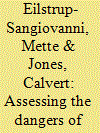|
|
|
Sort Order |
|
|
|
Items / Page
|
|
|
|
|
|
|
| Srl | Item |
| 1 |
ID:
083701


|
|
|
|
|
| Publication |
2008.
|
| Summary/Abstract |
Theoretical work on networked organization informs a large swathe of the current literature on international organized crime and terrorism in the field of international relations. Clandestine networks are portrayed as large, fluid, mobile, highly adaptable, and resilient. Many analysts have concluded that this makes them difficult for more stable, hierarchical states to combat. The prevailing mood of pessimism about the ability of states to combat illicit networks, however, may be premature. International relations scholars working in the area have often been too quick to draw parallels to the world of the firm, where networked organization has proven well adapted to the fast-moving global marketplace. They have consequently overlooked not only issues of community and trust but also problems of distance, coordination, and security, which may pose serious organizational difficulties for networks in general and for illicit networks in particular. Closer attention to a wider body of historical and contemporary research on dynamics of participation in underground movements, the life cycle of terrorism and insurgency, and vulnerabilities in organized crime reveals that clandestine networks are often not as adaptable or resilient as they are made out to be. An analysis of the al-Qaida network suggests that as al-Qaida adopts a more networked organization, it becomes exposed to a gamut of organizational dilemmas that threatens to reduce its unity, cohesion, and ability to act collectively.
|
|
|
|
|
|
|
|
|
|
|
|
|
|
|
|
| 2 |
ID:
083705


|
|
|
|
|
| Publication |
2008.
|
| Summary/Abstract |
Democracy promotion is a favored strategy to advance the cause of world peace, especially in the Greater Middle East, but undifferentiated democracy promotion has two faulty premises. First, all progress toward the establishment of democratic regimes does not necessarily make the global community safer. Second, regime change is not something external actors have the capacity to direct along desired pathways. The first assumption fails to consider the well-documented security problems caused by partial democracies. The second assumption overstates the ability of powerful outsiders to induce transitions to full democracy. These research findings are grounds for cautious and selective democracy promotion, not a blanket approach that is indifferent to the composition of the regimes designated to be reformed and democratized.
|
|
|
|
|
|
|
|
|
|
|
|
|
|
|
|
| 3 |
ID:
083702


|
|
|
|
|
| Publication |
2008.
|
| Summary/Abstract |
An examination of the onset, evolution, and termination of the 1999 and 2001-02 crises between India and Pakistan suggests that nuclear deterrence is robust in South Asia. Even though the 1999 crisis erupted into a war, its scope and dimensions were carefully circumscribed. Despite its conventional capabilities, India chose not to cross the Line of Control (the de facto international border in the disputed state of Jammu and Kashmir), and it avoided horizontal escalation of the conflict. India's restraint cannot be attributed either to timely U.S. intervention or to a concern about avoiding a bellicose international image. Instead a highly jingoistic regime, which had defied international public opinion the previous year through a series of nuclear tests, chose to exercise restraint because of Pakistan's possession of nuclear weapons. In 2001, despite grave Pakistani provocation through a series of terrorist attacks, India could only respond with a strategy of coercive diplomacy.
|
|
|
|
|
|
|
|
|
|
|
|
|
|
|
|
| 4 |
ID:
083704


|
|
|
|
|
| Publication |
2008.
|
| Summary/Abstract |
Since the 2006 bombing of the al-Askari Mosque, 4.5 million Iraqis have fled their homes, and displacement has become a central strategy in the civil war. Militant groups have engineered these colossal population movements to consolidate their power and expand their territorial claims. As this crisis demonstrates, displacement can expand and intensify violence during a civil war. In addition, refugee flows increase the risk that conflict will spread across international borders. In some cases, refugee militarization can lead to international war and regional destabilization. Even if the displaced Iraqis do not join militant groups, their mere presence will exacerbate political tensions. To prevent the wide-scale militarization of the displaced Iraqis, donors and host states should heed the following policy recommendations. First, provide a massive infusion of humanitarian aid. Second, resist the temptation to build camps to house the displaced. Third, do not return the displaced people home against their will. Fourth, expand and expedite the resettlement process, especially for vulnerable Iraqis such as those who were once coalition employees.
|
|
|
|
|
|
|
|
|
|
|
|
|
|
|
|
| 5 |
ID:
083703


|
|
|
|
|
| Publication |
2008.
|
| Summary/Abstract |
The tenth anniversary of India's and Pakistan's 1998 nuclear tests enables scholars to revisit the issue of South Asian proliferation with a decade of hindsight. What lessons do the intervening years hold regarding nuclear weapons' impact on South Asian security? Some scholars claim that nuclear weapons had a beneficial effect during this period, helping to stabilize historically volatile Indo-Pakistani relations. Such optimistic analyses of proliferation's regional security impact are mistaken, however. Nuclear weapons have had two destabilizing effects on the South Asian security environment. First, nuclear weapons' ability to shield Pakistan against all-out Indian retaliation, and to attract international attention to Pakistan's dispute with India, encouraged aggressive Pakistani behavior. This, in turn, provoked forceful Indian responses, ranging from large-scale mobilization to limited war. Although the resulting Indo-Pakistani crises did not lead to nuclear or full-scale conventional conflict, such fortunate outcomes were not guaranteed and did not result primarily from nuclear deterrence. Second, these Indo-Pakistani crises led India to adopt a more aggressive conventional military posture toward Pakistan. This development could exacerbate regional security-dilemma dynamics and increase the likelihood of Indo-Pakistani conflict in years to come. Thus nuclear weapons not only destabilized South Asia in the first decade after the nuclear tests; they may damage the regional security environment well into the future.
|
|
|
|
|
|
|
|
|
|
|
|
|
|
|
|
| 6 |
ID:
083706


|
|
|
|
|
| Publication |
2008.
|
| Summary/Abstract |
Scholars typically define appeasement as a policy of satisfying grievances through one-sided concessions to avoid war for the foreseeable future and, therefore, as an alternative to balancing. They traditionally interpret British appeasement of Adolf Hitler in the 1930s as a naïve attempt to maintain peace with Germany by satisfying his grievances. The standard conceptualization of appeasement and the empirical treatment of the 1930s, however, are theoretically limiting and historically incorrect. Appeasement is a strategy of sustained, asymmetrical concessions with the aim of avoiding war, at least in the short term. There are three distinct variations of appeasement: (1) resolving grievances (to avoid war for the foreseeable future); (2) diffusing secondary threats (to focus on a greater threat); and (3) buying time (to rearm and/or secure allies against the current threat). British appeasement was primarily a strategy of buying time for rearmament against Germany. British leaders understood the Nazi menace and did not expect that appeasement would avoid an eventual war with Germany. They believed that by the time of the Rhineland crisis of 1936 the balance of power had already shifted in Germany's favor, but that British rearmament would work to reverse the balance by the end of the decade. Appeasement was a strategy to delay an expected confrontation with Germany until the military balance was more favorable.
|
|
|
|
|
|
|
|
|
|
|
|
|
|
|
|
|
|
|
|
|